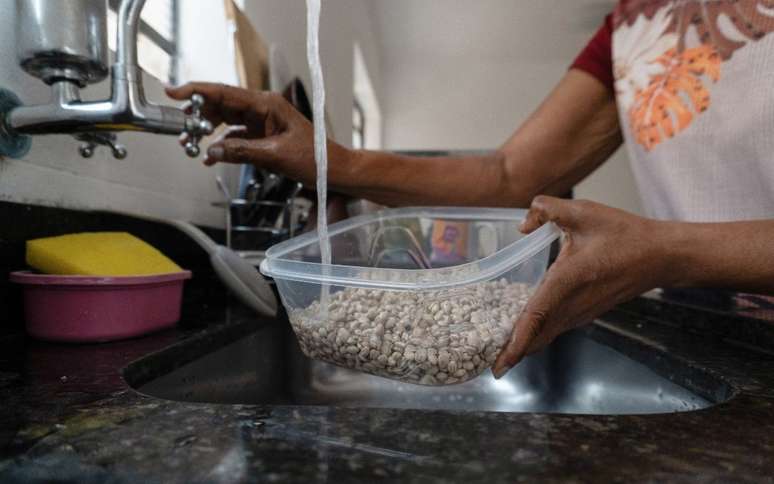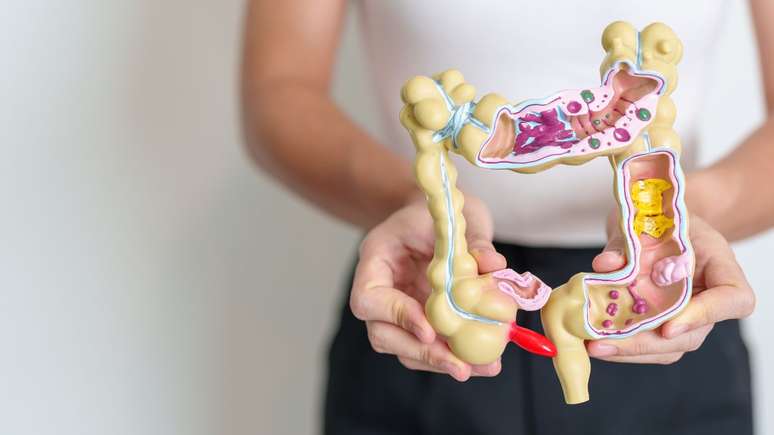The condition of the character Chiara in ‘Travessia’ is also called ‘factoid disorder’, as the patient believes his own lie
After several controversies related to acting, Giada Picone will face a new challenge in the novel crossing, by Rede Globo. The character of Chiara, played by the actress, will be diagnosed Munchausen syndrome or factoid disordera condition in which a person injures themselves and pretends to have symptoms in order to be hospitalized.
The syndrome was described in 1951 by the English physician Richard Asher and was named in honor of the Baron of Munchausen, a German whose fanciful adventures became a book. Patients with this disorder often feign symptoms of illness to be treated by a hospital’s medical staff. “Unconsciously, her (person with the syndrome) tries to be under medical treatment, that almost maternal affection that a sick person has when he is treated “, sums up Dr. Vanessa Citero, coordinator of the Mental Health Service of the Unifesp University Hospital and lecturer at the Department of Psychiatry of the ‘University.
The specialist says she assists, on average, two to three patients a year with this condition at the University Hospital alone. The diagnosis, however, is complicated: no one believes that the patient is harming himself on purpose to stay longer in the health center. One of the cases that shocked her team the most was that of a young woman who asked to be intubated because she believed she had something serious in her lung, even though the tests came back negative.
“The case was very strange, because the bacterium we found was present in the stool. So we suspected it infecting the venous access with the stool when we weren’t looking, to get the bacteria to reach the blood,” he recalls. This patient died shortly after and the suspicion could not be confirmed.
What is the difference between Munchausen syndrome and hypochondria?
The main feature of factoid distortion is that the person causes the symptoms with the intention of getting sick. The scenario is different from a hypochondriac person, for example, who is afraid of getting sick. Psychiatrist Antônio Freire, coordinator of the Medical Residency Program in Psychiatry at Juliano Moreira Hospital, Salvador, points out that the anxiety associated with hypochondria is having to undergo tests to make sure there is nothing wrong with the body, while the Munchausen may be related to mythomania – disturbance of those who necessarily lie.
“The hypochondriac has no symptoms, he feels bad when he knows he can be sick. It does not produce the disease or the image of pretending to be sick,” explains the professor of the Federal University of Bahia (UFBA) and the School of Medicine. and Public Health of Bahia (Bahiana).
The last patient with this disorder seen by the doctor, about three months ago, was a woman of about 50 years. She had a depressive condition and, as she was time to be discharged, new symptoms appeared, such as tremors and physical exhaustion, which barely allowed her to get out of bed.
“We were worried that he had cerebral ischemia, even if the possibilities were slim. So we asked the neurology department for an evaluation, we asked for resonance, several tests, until we realized that he was looking for attention and he” I don’t want it. go home, “he says. Another common practice in patients with this syndrome treated by him is to cut themselves during urine tests, so that the test detects some kind of internal bleeding.
In another case, assisted by Kythero, the patient presented with hypoglycemia. The condition was visible on scans, but there were no problems with the kidneys or other internal organs that would attest to this condition, as well as any difficulty in eating or eating. After a period of hospitalization, the team found insulin vials thrown in the bathroom trash – he injected himself to cause illness.
How is Munchausen syndrome diagnosed?
Both psychiatrists agree that diagnosis often takes a long time. After all, whatever the complaint is, the medical team has an obligation to analyze every symptom and every possible disease that could cause the condition before believing it is just a made-up narrative.
“The patient will always try to take a story that is close to some disease, so, for example, he will read, study the case he wants to appear to have,” reinforces Citero. It is common, for example, for people with factoid disorder to be in the field of health and understand the behavior of the human body.
Another point highlighted by experts is that people with this disorder like to discuss with medical staff, suggesting tests and procedures relevant to the situation. Freire also points out that he perceives another pattern in patients: it is common for them to present themselves in emergency situations on weekends and holidays, when professionals who attend him tend to be less experienced and may take longer to notice the disorder.
Also, this group of people reacts well to the fact that they have to stay in the hospital longer, taking serum or other medications into the vein without having any kind of fear. Thus, they end up making friends with the medical center staff. “So when someone raises the possibility ‘I think so and so does Munchausen’, the group complains. They say ‘but how can you think of someone so dear, who helps us so much?’, Adds nurse Simone Algeri, a professor at the Federal University of Rio Grande do Sul (UFRS) and coordinator of the training course to address violence in the family at the Hospital das Clínicas de Porto Alegre.
What is Munchausen by proxy?
The professional has been dealing with another aspect of the disease for 19 years: the Munchausen by proxy or by proxy. In this case, the patient does not inflict harm on himself, but on his own child. The intention behind the crime is the same, to draw attention to oneself, but not as an “incurable patient”, but as a “saving mother”.
There are reports of other relatives taking this action, but most of the known cases involve the attacking mother. One of the most famous is the American Blanchard Gypsy Rose, who has spent his entire life believing that he has a serious illness because of his mother, Dee Dee. After discovering the truth, after years of not being able to walk or speak properly, he ended up killing her mother.
The story is represented in the series The actfrom Star + and in the documentary Dear and dead momfrom HBO Max. The syndrome is also portrayed in the fiction series Sharp objectsbased on the book of the same name by author Gillian Flynn and the autobiography i am not sickwritten by Julie Gregory, based on home experiences.
“I think we have more cases of women because it is they who take care of the children, it is the woman who takes them to the hospital. In the case of a sex offender, for example, they do not take the child to the hospital AND that person (with Monaco) door, “says Algiers.
One of the most emblematic cases cited by the teacher is that of a child who had blood in his urine, without the patient presenting any bladder deficiency. After a while he noticed that her mother was putting red aniline, a dye used in cakes, in all of her daughter’s drinks. In another violent situation she witnessed, the mother asphyxiated the child with a pillow and then called the medical team to intubate her with mechanical ventilation. Some mothers diagnosed at the site had already lost a child to other diseases, which makes the professional reinforce the need to train professionals for a quick diagnosis.
What is the treatment for Munchausen syndrome?
In the case of fictitious disturbance caused to third parties, the solution is simpler, even if demanding: it is necessary to remove the underage victim from the aggressor’s care. The nurse points out that several times it is necessary to convene the Board of Protection and the organs of justice. “What we always feel first is the ‘extended family’: a grandmother, an aunt, a father. However, in my experience, I see that most of the women in this situation are alone, without support”, details Algiers.
However, there are cases of mothers with a support network suffering from the disorder. Social worker Myriam Fonte Marques, coordinator of the child protection program at the Hospital de Clínicas de Porto Alegre and a co-worker from Algiers, notes that mothers with Munchausen syndrome appear to be loving and caring mothers, always concerned about the welfare of their children.
“About five years ago we received a legally constituted middle-class couple with three children. Only over time did we realize that the mother mistreated them all, passing on to her youngest child as soon as another was born. Her relatives were suspicious. , including the father of the children, but they felt bad at the thought that it could have happened, “he recalls. After a lawsuit, the woman lost custody of the children and only started seeing them under surveillance.
Another important point is that, unlike other parents, they are usually not bothered by invasive procedures on the baby, such as blood sampling. “The most classic case is the girl with convulsions. She is hospitalized here, no professional sees this happening, but the mother guarantees that she has convulsions,” she points out. In cases of strong suspicion of Munchausen, medical personnel may ask to see the cameras in the room, if any, to prove the disturbance.
When the victim gets hurt, the problem is more difficult to solve. Faced with a Munchausen diagnosis, the patient usually stops faking the disease and asks to be discharged immediately, as the symptoms have disappeared. However, the improvement is just a quick exit to be admitted to another hospital.
It may be recommended that the patient be admitted to a psychiatric hospital if his life is at risk. In milder cases, a multidisciplinary work group tries to make the person feel welcomed in other areas of life and in places other than hospitals.
What are the risks for a person with Munchausen syndrome?
The issue of hurting oneself or another, however, is not part of a plan to get a disability pension or a work certificate, for example, but rather to be looked after. “It is important to emphasize that the person does it knowingly, with a purpose, but not out of malice”, underlines Citero.
The greatest risk for patients with this syndrome is unintentionally ending up dying. Therefore, if you notice that a friend or family member has a similar condition, an evaluation with a responsible physician is needed as soon as possible.
+The best content in your email for free. Choose your favorite Earth Newsletter. Click here!
Source: Terra
Benjamin Smith is a fashion journalist and author at Gossipify, known for his coverage of the latest fashion trends and industry insights. He writes about clothing, shoes, accessories, and runway shows, providing in-depth analysis and unique perspectives. He’s respected for his ability to spot emerging designers and trends, and for providing practical fashion advice to readers.








